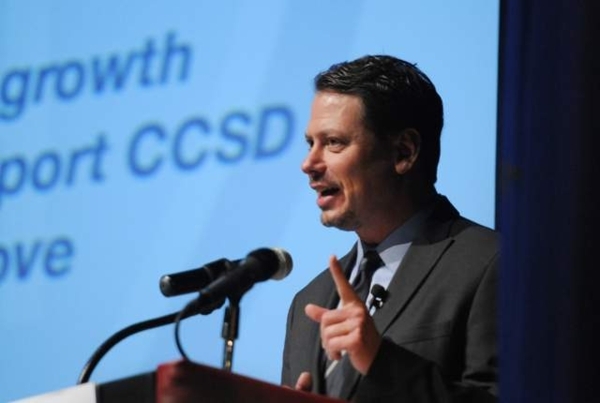Tensions arise between CCSD leader, school board
In his third year as chief of the nation's fifth-largest school district, Clark County Superintendent Pat Skorkowsky certainly has reason to think he's being pulled in several directions at once.
He oversees the education of 323,000 students. Contracts recently expired for nearly all district employee groups. Recruiters can't find enough teachers to fill hundreds of vacancies. And lawmakers soon will decide how best to break up the Clark County School District.
None of those issues, however, provoked Skorkowsky into describing himself as a human pinball.
That's the fault of the seven members of the Clark County School Board, who are publicly airing their grievances with each other and exasperating the superintendent with their private agendas.
"I am bouncing back and forth with your priorities," Skorkowsky abruptly told School Board President Linda Young during an Aug. 14 retreat at a Mount Charleston lodge.
"Let me finish," the superintendent told Young as she tried to interrupt his explanation of what it's like to juggle her individual objectives against those of six other board members.
"I am a pinball in a machine sometimes," Skorkowsky said. "That's the way I feel. These past two weeks have been probably the most difficult."
He referred to the dizzying list of education reforms passed this year by state lawmakers for the current school year.
But at the retreat, with less than two weeks to go before the start of school, Skorkowsky said he was forced to delegate that work to other administrators because of the number of requests his seven elected bosses were making of him.
'Thou Shalt Not'
It's a dynamic that could change, for better or worse, depending on whether Skorkowsky and the board agree to change the rules that govern their interaction.
For more than a decade, policy governance — popular in corporate boardrooms — has shaped trustee interactions with each other and the superintendent.
The approach mandates a largely at-arm's-length relationship in which a series of "thou shalt not" statements restricts board overreach and prevents micromanagement.
Under policy governance, the board adopts policies and mostly stands back as the superintendent makes on-the-ground decisions about operations and programs. It's an approach that no longer satisfies some trustees.
"We're elected officials, and people expect us to be able to produce results," District A Trustee Deanna Wright said at the retreat.
While a previous board might have adopted policy governance to restrain activist trustees, Wright said she dislikes the hands-off provisions that restrict what changes she can achieve.
Parents and community members often contact her with complaints and want to see proof that she worked with school staff to find solutions, Wright said.
"Look, I don't want the superintendent — whether it be Pat or anybody else — to be undermined in any way," she said. "I don't want to necessarily do daily operational things, but I think that at an overarching level, there are some decision-making processes that maybe we should be involved in."
Referring to Skorkowsky's regular meetings with top-level administrators, Wright added, "I don't know how many of us have ever been invited to sit in a Cabinet meeting."
'We're Lacking'
Most of Wright's fellow board members expressed similar dissatisfaction with the policy governance constraints on them. In its place, they soon may adopt a more recently developed system called balanced governance.
The new approach attempts to strike a balance between the extremes of school board micromanagement and just serving as a rubber-stamp for superintendents. Balanced governance, like policy governance, also has the potential to rein in the activism of any one trustee, requiring each board member to persuade a majority of colleagues to enact change.
However, the current board fails to reach much consensus on the most pressing issues now facing the district, namely sex education, employee contract issues and the district's budget priorities.
Trustees can't even agree on the health of their relationships with each other.
"(Do) we build trust between and among each other by treating everyone with dignity and respect? I think we're lacking in that," District F Trustee Carolyn Edwards said last week.
She recently told her board colleagues that she felt "marginalized" by their treatment of her in recent meetings.
Over the past several months, the board has quashed her attempts to start a discussion on changes to the district's sex education curriculum. Her opponents indicated they simply wanted to to give parents and community members more opportunities to have a role in the debate.
But their disagreement devolved so significantly at a July 16 meeting that, as the trustees argued over another request to discuss sex education, Wright interrupted to clarify that — in debating whether or not to debate sex education — the board actually was engaged in a debate about sex education.
"To some extent we're letting politics guide some of our decisions, and I know that's hard not to do because we are politicians," Edwards said. "But I think we could do better at that, and I think the clear distinction of board and superintendent roles is getting fuzzier, and that concerns me."
Other trustees bristled at that assessment.
District D Trustee Kevin Child described the board as "very healthy." District B Trustee Chris Garvey said the board remained "very congenial."
Young was even upbeat about the board's public disputes.
"We're very healthy, and I'll tell you why: We feel healthy enough to say we're not healthy," Young said Wednesday.
"We feel openness to challenge each other publicly. When people feel smothered or restricted, they won't do that."
For his part, Skorkowsky recently retreated from his comment about being a human pinball, saying that his relationship with board members should evolve to align with district priorities.
"We have to outline a structure," he added Tuesday, "so that we all understand our roles and responsibilities and are able to assist each other in meeting the goals of the district."
Contact Neal Morton at nmorton@reviewjournal.com or 702-383-0279. Find him on Twitter: @nealtmorton

















